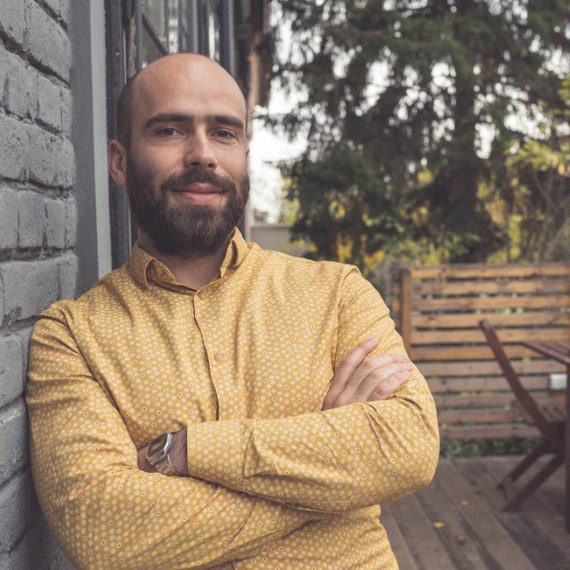As people juggle and struggle with their personal budgets, many turn to Google for answers on finance-related topics.
We’ve analysed the latest Google Trends to better understand what’s on everyone’s mind in these economically challenging times.
Here are three observations we’ve made:
1. People are asking many financial questions
The term “inflation” is among those phrases that have seen a significant increase in search interest this year, both here and around the world. The sharp increase in searches began as early as January 2022 and continued throughout the year.
This is what the inflation search trend looked like in Slovakia and neighbouring countries:

The state of the global economy – and personal finance – is a complex subject. It’s logical that people ask a lot of questions when they are trying to understand what’s going on in the world.
For example, interest in searching for “why” in the context of “expensive” has increased by 20% globally in the last 6 months alone.
In 2022, Google Trends saw increased interest in searches for phrases such as “why is butter so expensive” in the UK, “pourquoi pénurie moutarde” (“why is there a shortage of mustard”) in France and “warum steigendie preise” (“why are prices rising”) in Germany.
Moreover, people are concerned about the impact of inflation and how they can minimise its effect on their personal finances.
People all over the world are posing questions such as “what can I afford”, while in Poland it is “kiedy stopy procentowe” (“when will the new interest rates apply”), “what is the current ECB interest rate” in Slovakia, or “ČNB” in the Czech Republic. Phrases such as “insolvency law” and the new “interest calculation” have also grown in popularity.

2. An unexpected alliance: Saving money while saving the planet
Recent trends in Google search also show that in certain cases, sustainability goes hand in hand with inflation. As consumers look for ways to cut costs, many of the more affordable alternatives are also unexpectedly better for the environment.
Second-hand shopping is becoming increasingly popular
Just look at the increase in searches for the terms “second hand” and “used”. In the past, second-hand products sometimes carried a negative connotation.
However, the surge in selling via “second-hand” apps already tells us a very different story about the shopping preferences of today’s consumer, especially among the youngest of consumers.
Social media as an online marketplace
In the Czechoslovak environment, platforms such as Bazoš, Modrý koník bazár and Facebook Marketplace or its various alternatives (buy/sell/local flea market/bazaar) are experiencing a boom.
The unique feature of Facebook groups is that they group people under a certain location and city. A new player in this region is Vinted, a sales app for secondhand clothing.
Here you can see the increase in the sales trend of “second hand goods” in the Czech Republic.



Efficiency in the form of saving energy
Another area where the sustainable option has recently aligned with the cheaper option is ‘energy’. People are trying to save money because prices have skyrocketed. As a result, energy consumption has naturally fallen, which is of course positive news for the environment.
In 2022, Google Trends saw a peak in interest in “how to save energy” searches around the world.
The increase in interest in searches for phrases such as “hora más barata para poner la lavadora hoy” (“cheapest time to turn on the washing machine today”) in Spain, “elpriser time for time” (“hourly electricity rates”) in Denmark and “ile prądu zużywa klimatyzacja” (“how much electricity does air conditioning use”) in Poland indicates how deeply the energy crisis has affected the general population in different countries.
The issue of renewable energies is a trending topic in Slovakia as well. Associated subsidy schemes, such as the Renewable Energy Plan, can bring in huge amounts of funding that can increase demand for related products and services. This is already happening around the world.
For example, rising energy prices in Europe have increased searches for “incentivi auto elettriche” (“electric car incentives”) in Italy, “subventions panneaux solaires” (“solar panel subsidies”) in France and “subsidie warmtepomp” (“heat pump subsidies”) in the Netherlands.
3. Despite everything, people still want to treat themselves
In 2022, interest in “cheap” searches has also increased. For example, for ”tanie sukienki” (“cheap dresses”) in Poland, “en ucuz derin dondurucu” (“cheapest freezer”) in Turkey and “billigt kaffe” (“cheap coffee”) in Sweden.
In Slovakia, the phrases that grew in popularity the most over the last year were: cheap holidays 2022, cheap houses near Košice, cheap artificial flowers, cheapest electric car or cheapest firewood. All Slovakian trends can be found in Google Trends.
However, this does not mean that consumers are only looking for low-cost purchasing options.
Luxury sells
Phrases associated with “luxury” have grown as well. Search interest increased for items such as “luxury sonnenbrille” (“luxury sunglasses”) in Germany and “luxury underwear” in the UK.
In Slovakia, the highest growth was in searches for luxury underwear for men, luxury Christmas pastries, luxury curtains and luxury dining tables.
These figures indicate that despite economic uncertainty, people are trying to find the right balance between ‘cheap’ and ‘luxury’.
They are willing to wait and invest in more expensive purchases. On the other hand, they are also looking for alternative ways to squeeze these luxuries into their budget.
The ‘Lipstick theory’ in practice
The so-called ‘lipstick theory’ suggests that even if people can’t afford all their usual luxuries, they will still want to satisfy their need for “feeling luxurious”.
That doesn’t necessarily mean that you now have to start selling Chanel lipstick.
It is more about the underlying psychological aspect, whereby you should try to create products that still give people “that little feeling of luxury” but don’t cost too much. Lipstick instead of handbags. A smaller sized product for the same price. A luxurious looking watch from a less luxurious expensive brand, and so on.
How to succeed in uncertain times
We know that in times of rapid change and uncertainty, it’s important to stay in touch with the evolving needs and behaviours of your consumers.
Tools such as Google Search Trends give us an idea of what’s important to people at a given point in time, how people feel and what they are looking for.
To truly understand the mindset of today’s cash-strapped consumer, it’s also important to look at trends over the long term. It’s not the first time inflation and economic uncertainty have weighed on people’s minds, and it won’t be the last.
Trends as a reflection of reality
Before something becomes a “trend” in economic behaviour, it happens in real life. That is why we simply need to be in the loop. You don’t have to watch the news every day, but you should implement a certain newsfilter.
You don’t need a Nobel Prize in economics to know that 1+1=2.
Example: If mortgage rates are rising and we’ve been experiencing a real estate boom for a few years, society must naturally come to a point where the demand for new housing stops.
If two years of a global pandemic have brought us so much “new cheap money” for businesses and households that there is nothing meaningful to spend it on, it will likely contribute to inflation.
If war breaks out and energy prices skyrocket, in addition to a renewed rise in inflation, we can also expect a reduction in the amount of money that households have available for spending in shops and online stores.
High quality branding is essential
Regardless of the factors mentioned earlier, people will still want to spend meaningfully on things that are valuable to them.
That’s why now, more than ever, people are talking about branding. But beware, we don’t mean mindless spending on better “brand awareness”. What is important is meaningful communication of the added value of a brand’s product to the customer.
This article is a loose and extended adaptation of the English original, tailored to the needs of the Slovak and Czech markets.
If you need help with the financial or marketing effectiveness of your company, please don’t hesitate to contact us. Together we will push the boundaries of your business.







